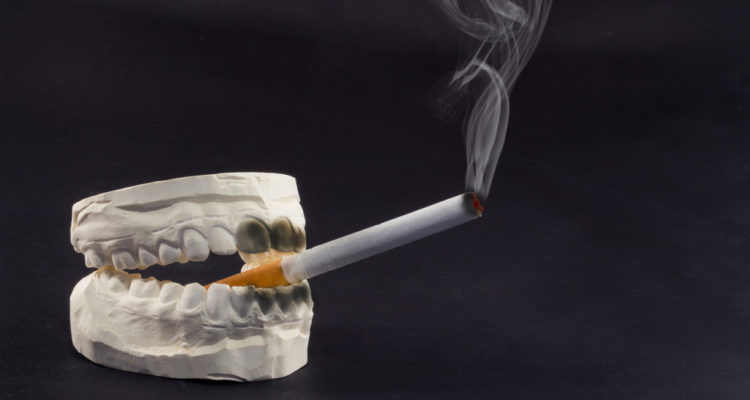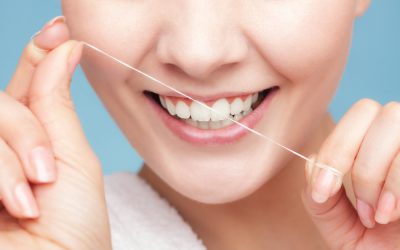It’s time to clear away the smokescreen: there is nothing “cool” about smoking. It is detrimental to the health of all your body’s systems and approximately one out of every five people will die from smoking related illnesses each year, according to the American Cancer Society. There is no safe way to smoke: cigarettes, cigars, pipes, and smokeless tobacco all carry dangerous risks to your health, including the health of your mouth and teeth. Given that it is the main area of contact for smoke, nicotine, tobacco, tar, and other harmful chemicals found in cigarettes, the mouth is especially vulnerable to the negative impact smoking can have on your oral health.
Smoking is one of the leading causes of gum disease. Gingivitis is an infection of gums that develops when bacteria gets under the gums and plaque and tartar build up, resulting in gums that are swollen, painful, and red. If the infection is not treated early, the disease progresses and becomes periodontitis. At this stage, gums begin to pull away from teeth, forming abscesses that trap bacteria and become infected. Bone and tissue begin to break down around the affected area, and the breakdown of teeth’s supportive structures eventually leads to tooth extraction. Gum disease is the number one reason behind tooth loss in adults. Smoking both causes gingivitis and exponentially increases the risk of developing periodontitis, by several means:
- Smoking weakens the body’s immune system, leaving it unable to fight off existing infection.
- Smoking constricts blood vessels and prevents adequate oxygen from reaching the body’s bloodstream. In the mouth, this hinders oxygen and nutrients from reaching damaged gums and significantly delays the wound healing process.
- Smokers have three to six times the risk of developing gum disease as non-smokers, and this risk increases with the number of cigarettes smoked and the amount of time spent smoking.
- Due to the delayed healing process, treatment and surgery for periodontitis may be less effective than it is for non-smokers. If gum disease is left untreated, it progresses and causes far more dangerous and permanent effects.
In addition to increased risk of gum disease, smoking has numerous unpleasant and even dangerous effects on your mouth and teeth:
- Nicotine and tar stain teeth yellow, and long-time smokers can expect that yellow tinge to darken towards brown over time.
- Smoking causes bad breath and can alter or dull your sense of taste.
- Smoking increases the risk of developing mouth, throat, lip, and tongue cancers. It also increases the occurrence of oral leukoplakia, which are precancerous white lesions in the mouth that may progress into oral cancer. Oral cancers can be aggressive and difficult to treat; many cancers of the mouth, throat, and tongue produce no symptoms or pain in the early stages and are only discovered once they’ve metastasized to another area of the head or neck – like the lymph nodes.
- Smoking can lead to gum recession, increased production of bad bacteria, and tooth decay.
- Additionally, smoking can complicate other issues of the mouth and teeth. It can delay healing following an oral surgery – such as tooth extraction – and it increases the likelihood of dental implant failure.
- Smoking irritates the salivary gland ducts in the mouth. Smokers can develop nicotine stomatitis (also called smokers palate), which occurs when the inside of the mouth is exposed to extreme heat that turns the palate white and “cracked” looking. Protruding red bumps might also be present, from inflamed and irritated salivary gland duct openings. The white lesion on the roof of the mouth may be irritating and uncomfortable, and nicotine stomatitis is only treatable by smoking cessation.
Due to the many oral health risks associated with smoking, regular dental appointments are crucial for smokers. At your exam, your dentist will examine your mouth and teeth for any signs of gum disease or oral cancer. Maintain a good oral hygiene routine at home; brush at least twice daily, floss once daily, and use a fluoridated mouthwash once daily. Of course, the best way to keep your mouth safe is to quit smoking. For former smokers who quit, the risks of gum disease and oral cancer – and the risks of developing these conditions in the future – reduces drastically. Even just cutting down on the number of cigarettes smoked a day lowers the risk level.
If you have questions for Dr. Boyett about the effects smoking can have on your oral health, call Boyett Family Dentistry today at 863-294-9200 and schedule an appointment.





